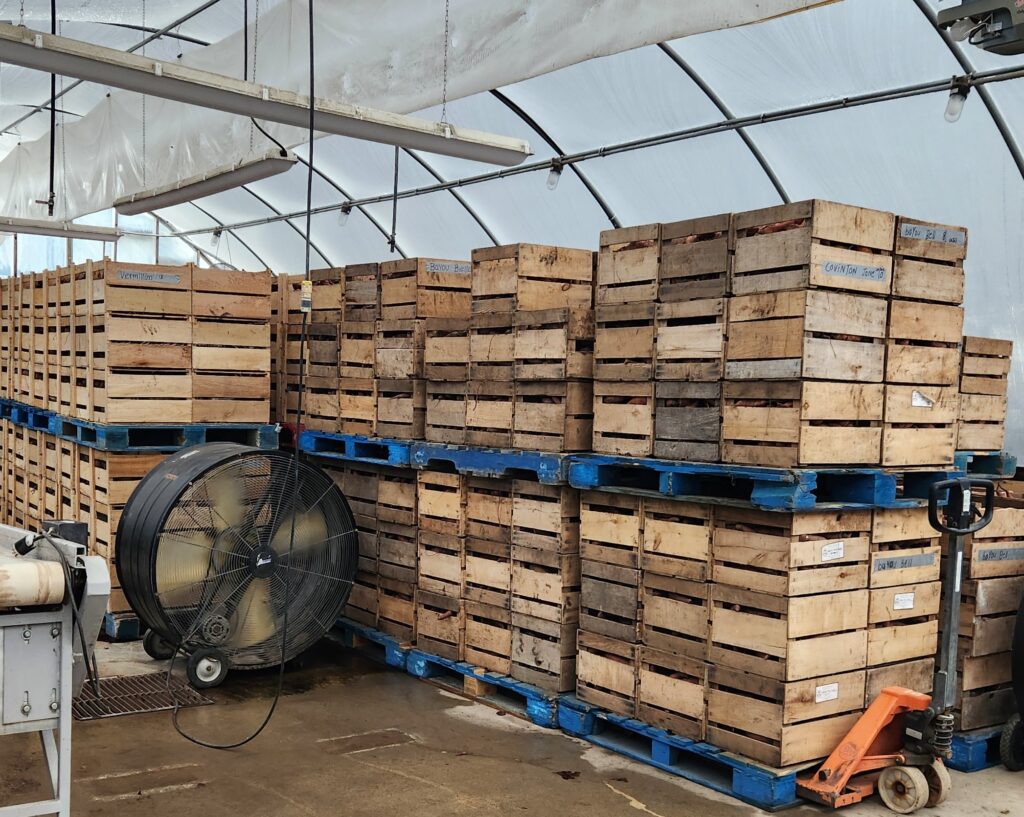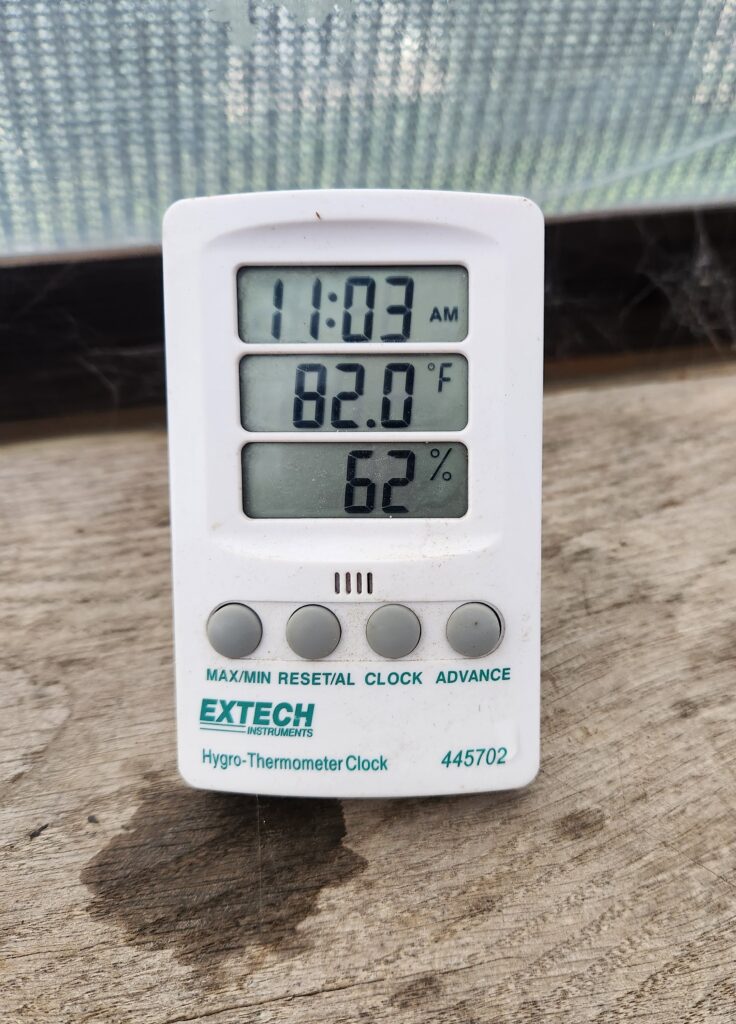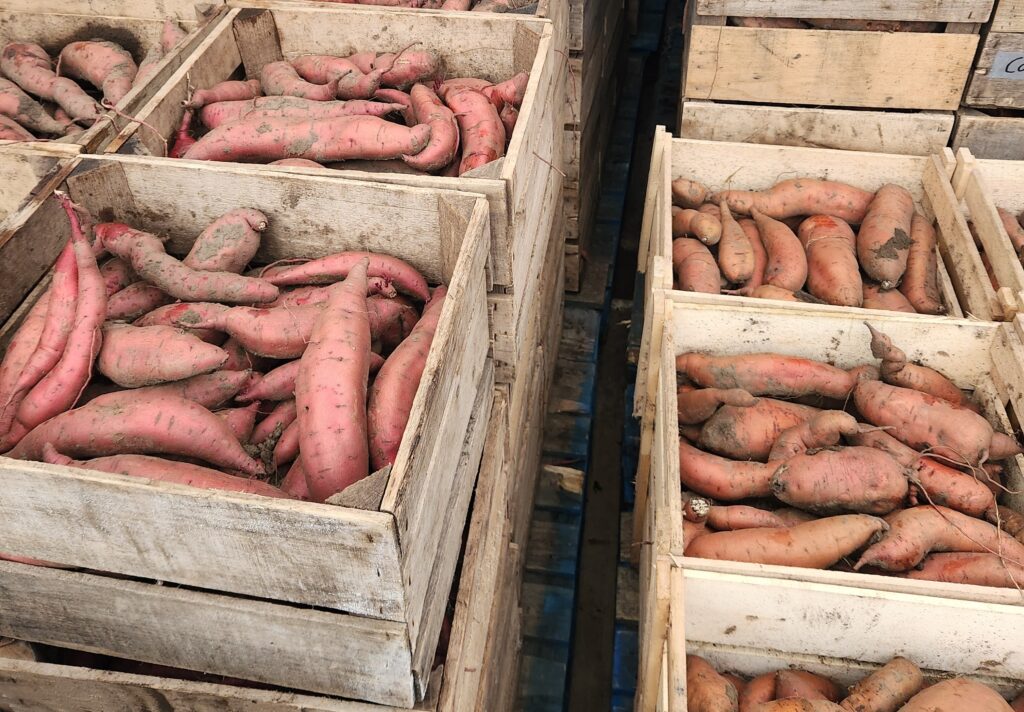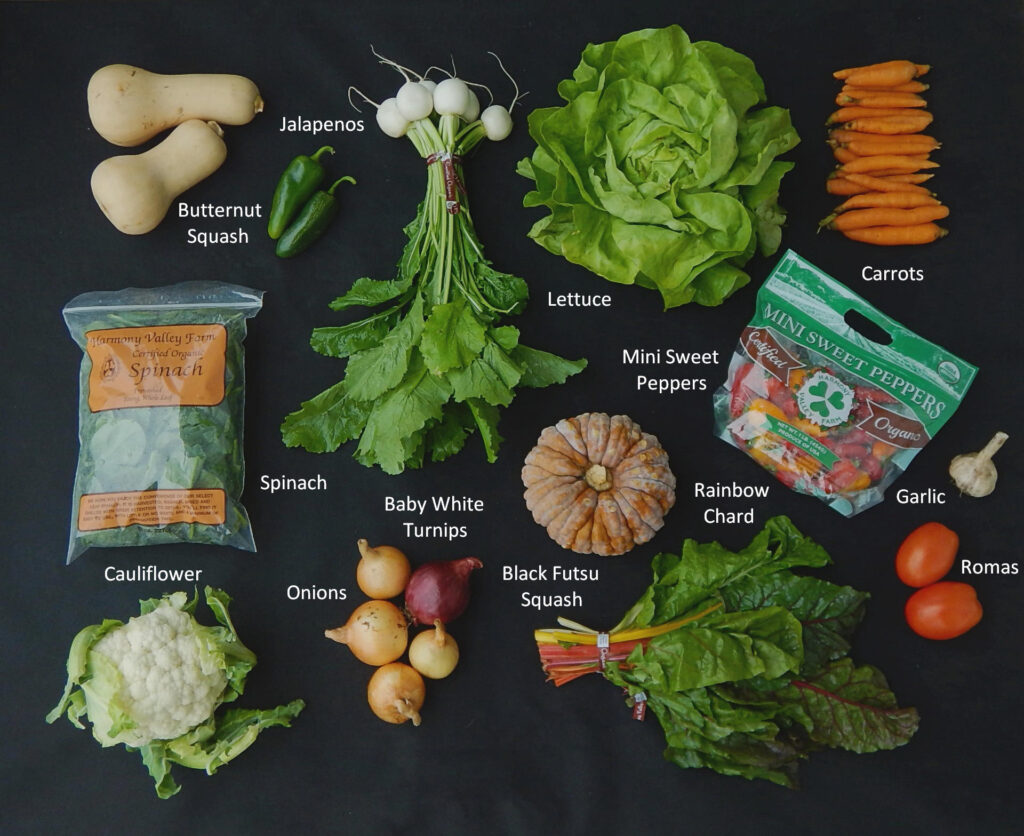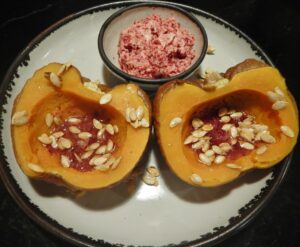What’s In The Box with Recipe Suggestions
White, Purple or Yellow Cauliflower or Broccoli Romanesco or Broccoli: We’re nearing the end of our fall run on cauliflower and broccoli Romanesco. Make a sheet pan of roasted vegetables this week with cauliflower, carrots, and onions!
Creamy Roasted Cauliflower Soup
Cream of Carrot & Cauliflower Soup
Orange Carrots: Carrots will store well in your refrigerator for weeks, so don’t fret if you have gotten behind on your carrot consumption. Use carrots as a main ingredient such as in Carrot Soup or Carrot Muffins. Carrots may also be used to add sweetness and background flavor to sauces, broth, soups and stews.
Quinoa Carrot Breakfast Cookies
Italian Garlic: Roast the bulb whole and then squeeze the soft, caramelized garlic out of their skins. Use it to mix with butter for toast!
Green Boston or Red Batavia Lettuce: This is the last of our fall lettuce varieties. Soon we’ll be shifting gears to fall chicories including some gorgeous heads of escarole.
Yellow & Red Onions: Check out this recipe for Cider Braised Chicken with Apples and Onions. It’s the perfect way to highlight fall flavors!
Cider Braised Chicken with Apples and Onions
Jalapeño Peppers: There are two jalapeños in your box this week. Some may be green and others red, both are delicious and used the same way!
Mini Sweet Peppers: Pepper season is almost finished, so savor each bite of these sweet peppers! Stuff them with cream cheese, roast them with squash or potatoes, or freeze them for use during the winter!
Grilled Mini Sweet Peppers with Goat Cheese
Spinach: This week’s spinach is a bit on the delicate side, which made it difficult to spin it dry without damaging the leaves. We recommend you place a clean paper towel inside your bag of spinach to absorb any extra drops of water and store it in the refrigerator. This will help to maximize the shelf life. If you’re cooking with the spinach, a little extra water on the leaves will actually help to steam and wilt it down.
Black Futsu Squash: Read more about this unique Japanese heirloom pumpkin in this week’s vegetable feature. Until you’re ready to use them, use them as a fall decoration in your home!
Butternut Squash: So far, this variety has been storing very well. Store it in a cool, dry location until you are ready to use it. If you see any signs of decay starting, cut that portion away and immediately use the remainder.
Butternut Squash & Cranberry Quinoa Salad
Rainbow Chard: Rainbow chard is one of our staple summer/fall greens, rich in nutrients and flavor.
Tuscan Chard and Cannellini Bean Soup
Roma Tomatoes: We are at the end of the tomato season! As such, the fruit may be a bit more delicate than usual. Handle your tomatoes with care, and eat them as sooner rather than later. Keep your eye on them and separate any that start to form bad spots, etc.
Tomato & Cream Cheese Turnovers
Baby White Turnips: The turnips are tender and have very thin skin that does not require peeling. The greens are edible too, so make sure you put them to good use as a salad green or lightly sauté them.
Turnip Noodle Bowls with Grilled Chicken & Turnip Greens Pesto
Grilled Salmon Salad with Turnips & Capers
Vegetable Feature: Black Futsu Pumpkins (Squash)
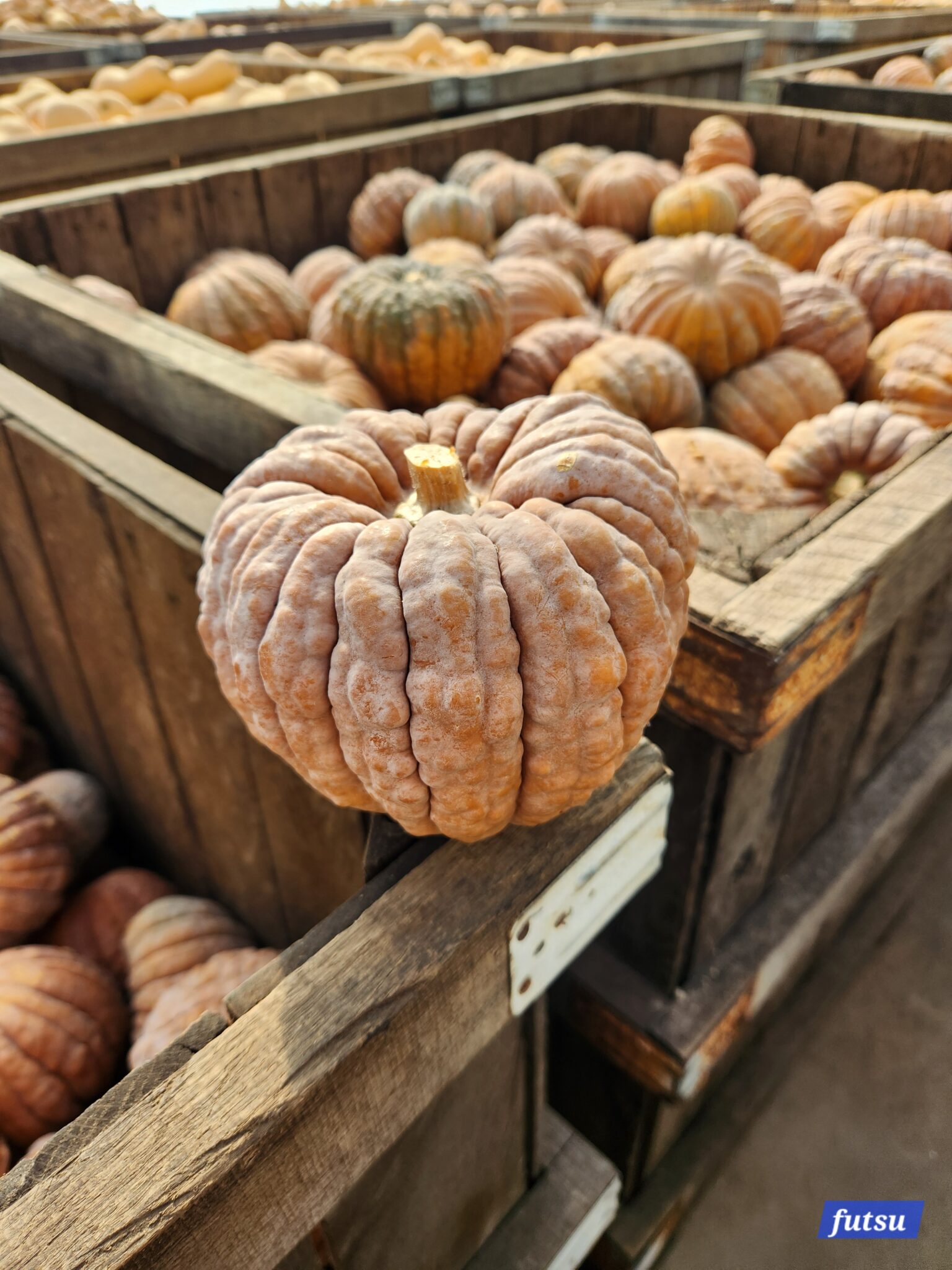
This week we are excited to feature the beautiful, unique Black Futsu Pumpkin! This is an heirloom Japanese squash variety. We first trialed this squash variety in 2019, and it was a success, so we planted more the next year and, once again, were very impressed with this unique little pumpkin! In case you’re wondering if this is a pumpkin or a squash, it’s a squash. In Japan they use the terms “pumpkin” and “squash” interchangeably.
When we first harvest these, their skin is more like a charcoal gray to green color and some are just starting to show some signs of changing to a buff tan color. They continue to ripen in storage until they are entirely buff color. I mention this because you may never see that charcoal gray stage, which I suspect is the reason they are called “Black Futsu.” One of the other qualities we really like about the Black Futsu is that they store very well. So, eat them now or keep them on your counter and enjoy their beauty for a bit before you eat them.
The flesh is dense and holds up well to roasting and pan-frying. When baked, either whole or cut in half, the flesh is moist, smooth, creamy and sweet. The other unique attribute is that the skin is edible. It does have a very thin skin and given the bumpiness of the exterior, it is suggested you do not try and peel it. When pan-fried or roasted the skin gets nice and crispy and offers a contrast to the soft, smooth flesh. When baked, we do not find the skin as delectable, however it’s easier to scrape the flesh out of the skin if you bake it whole. If you don’t care to eat the skin, simply discard it.
This variety is delicious when roasted. You can either cut them into wedges or chunks, toss them with oil, then roast them on a sheet tray. While we usually don’t pan-fry squash, this one is a candidate for this method. Cut in thin slices about ⅛ -¼ inch thick. Cooking them on a griddle or in a cast iron pan in butter yields a nice crispy, golden final product. You can also cut them in half and bake them in the oven. Honestly, if you don’t want to mess with anything else, just bake them and eat the flesh seasoned with a touch of salt and pepper and a pat of butter. It’s delicious just like that, however you could also stuff the squash halves with a filling of your choice. Of course, you can scrape the cooked flesh out of the shell and use it to make a wide variety of things.
Store your Black Futsu squash at room temperature and use them as a decoration until you’re ready to use them. Don’t forget that the seeds are also edible. Before cooking, extract them from the flesh, rinse them and lay them out on a tea towel (the seeds will stick to the towel, so don’t use paper or anything fuzzy) or a plate to dry. Once dry you can toss them with a little oil and season them with salt and pepper or seasonings of your choosing before toasting them in a 350°F oven. These seeds really are tasty and worth the effort to extract them. One more tidbit of information you may find useful is that one medium sized Black Futsu squash will yield about ¾-1 cup of cooked flesh.
Short & Sweet Weekly Farm Update
The big news of this week (well, really last week but it was after the emails) is that we have harvested all of our Sweet Potatoes for this season. They are curing comfortably in very warm and humid temperatures in our greenhouse. “Curing” is a process whereby we hold the sweet potatoes immediately after they are harvested in an environment that has high heat and humidity for 7-10 days. During this time the starches convert to sugars, thereby making them “sweet.” This process also helps to harden the skin as well, which helps enhance their storage potential.
Their time is almost finished in their sauna, so we should start seeing sweet potatoes in our CSA boxes next week! We will try to include variety names so you can provide feedback about them. We should also remind you that we do always appreciate feedback, good or bad. We don’t know if there is a problem if we are not made aware of it. Please always feel comfortable enough to respectfully email csa@harmonyvalleyfarm.com the good, the bad or the ugly (Kelly does like ‘odd’ vegetable pics and the crew brings them to her so she can take pics too).
